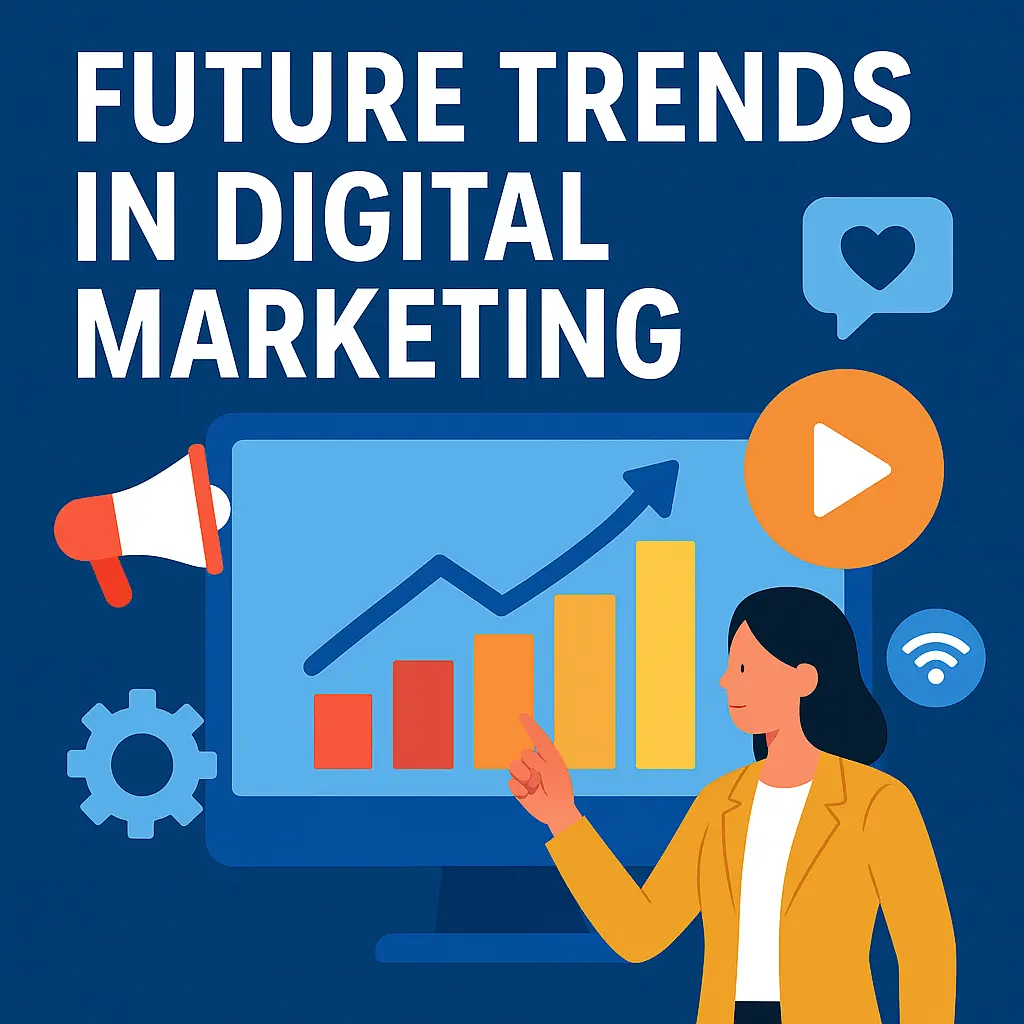Future Trends in Digital Marketing

Introduction of future Trends in Digital Marketing, Digital marketing has become the backbone of business growth in today’s competitive world. With technology advancing at lightning speed, consumer behavior is shifting faster than ever. Traditional marketing methods alone are no longer sufficient to grab audience attention. Businesses must stay ahead by adopting new trends and tools.
The future of digital marketing promises a more personalized, immersive, and ethical approach. From artificial intelligence to sustainability, every element contributes to how brands engage customers. In this article, we will explore the major future trends that are set to transform digital marketing.
Role Of Artificial Intelligence In Future Trends in Digital Marketing
Artificial intelligence (AI) is one of the most powerful forces shaping digital marketing. Businesses use AI to collect and analyze huge amounts of customer data. This enables businesses to analyze consumer habits and forecast upcoming behaviors.
- AI-powered chatbots provide instant support and solve customer queries 24/7.
- Predictive analytics helps businesses target the right audience at the right time.
- Smart algorithms personalize recommendations based on browsing history.
For example, Netflix and Amazon already use AI to suggest shows and products. Marketers across industries will rely more on AI tools in the future.
Role Of Hyper-Personalization In Future Trends in Digital Marketing
Consumers no longer respond to generic messages. They expect brands to deliver highly relevant and personalized content. Hyper-personalization leverages data, artificial intelligence, and automation to deliver tailored customer experiences.
Examples of Hyper-Personalization
- Emails with personalized subject lines increase open rates.
- E-commerce sites use past purchases to suggest new products.
- Streaming services design playlists for individual users.
Personalization not only drives higher sales but also builds stronger customer loyalty. Companies that neglect it risk losing clients to their rivals.
The Impact of Voice Search and Conversational Marketing on the Future of Digital Marketing.
Search engines are being used differently as voice technology continues to evolve. Devices like Alexa, Google Assistant, and Siri are becoming household essentials.
Why Voice Search Matters for SEO
- People use natural language when speaking, not keywords.
- Voice queries are longer and more specific.
- Local businesses benefit as users often search “near me” services.
Conversational marketing also relies on chatbots and voice assistants. This direct communication builds stronger engagement and enhances customer satisfaction.
Role Of Influencer Marketing In Future Trends in Digital Marketing
Influencer marketing has exploded in recent years, but the approach is evolving. Audiences prefer authentic connections over celebrity endorsements.
Trends in Influencer Marketing
- Micro-influencers with smaller but loyal audiences gain more trust.
- Brands seek long-term partnerships instead of one-off promotions.
- Transparency becomes vital as customers demand honesty.
For example, beauty brands now collaborate with everyday creators rather than A-list celebrities. This ensures credibility and relatability.
Role Of Video Content In Future Trends in Digital Marketing
Video remains the most powerful form of content, with studies revealing that people retain information more effectively through video than written text.
Types of Video Content That Drive Results
- Short-form videos like Instagram Reels and TikTok clips.
- Live streaming events that allow real-time interaction.
- Explainer videos for product demonstrations.
- Interactive ads that encourage immediate action.
Video marketing not only increases brand awareness but also improves conversions. The trend will continue to grow as 5G technology expands.
Role Of Immersive Technologies In Future Trends in Digital Marketing
Digital marketing is being transformed by Augmented Reality (AR) and Virtual Reality (VR). These tools allow customers to experience products before purchase.
Practical Applications of AR and VR
- Fashion brands offer virtual fitting rooms.
- Furniture companies allow customers to place items in their homes digitally.
- Travel businesses create VR tours of destinations.
Immersive experiences reduce buyer hesitation and build confidence. As technology becomes more affordable, more brands will adopt AR and VR strategies.
Role Of Social Commerce In Future Trends in Digital Marketing
Social commerce is blending shopping with social media. Platforms like Instagram, TikTok, and Facebook now allow in-app purchases.
Benefits of Social Commerce
- Shortens the buying journey by removing extra steps.
- Encourages impulse purchases with shoppable posts.
- Expands reach through influencer-driven promotions.
For instance, TikTok’s shopping feature lets users buy products showcased in videos instantly. This trend will keep growing as social platforms invest more in e-commerce features.
Role Of Sustainability and Ethical Branding In Future Trends in Digital Marketing
Today’s consumers are more socially conscious. They prefer brands that care about the environment and practice ethical business.
Sustainability in Marketing
- Eco-friendly packaging is highlighted in campaigns.
- Companies showcase efforts to reduce carbon footprints.
- Brands promote fair-trade and ethical sourcing.
Ethical marketing goes beyond products. It’s about showing customers that the brand supports causes they care about. This builds long-term trust and loyalty.
Data Privacy and Consumer Trust In Future Trends in Digital Marketing
With rising concerns about data misuse, consumers want more control. Governments are enforcing strict data protection laws like GDPR and CCPA.
Key Points in Data Privacy
- Brands must ask for clear consent before collecting data.
- Transparent privacy policies build trust.
- Secure systems protect sensitive customer information.
Balancing personalization with privacy will be a major challenge. Companies that respect privacy will have a stronger reputation in the digital marketplace.
In Future Trends in Digital Marketing, Role Of Marketing Automation
Automation is changing how marketers manage campaigns. It reduces repetitive tasks and ensures timely communication.
Examples of Marketing Automation
- Automated email sequences that nurture leads.
- AI-driven ad placements on Google and social media.
- Chatbots providing real-time support.
Automation saves time and improves ROI. It allows businesses to focus more on strategy rather than manual work.
In Future Trends in Digital Marketing, Omnichannel Marketing: Seamless Brand Experience
Modern customers interact with brands through multiple platforms. Omnichannel marketing ensures a consistent and seamless experience for customers across every channel.
Why Omnichannel Matters
- Many consumers browse products on their smartphones but finalize their purchases on desktop computers.
- Consistent messaging builds stronger recognition.
- Integration of online and offline experiences increases satisfaction.
For example, Starbucks connects its app, website, and in-store services into a single experience. More businesses will adopt this approach in the future.
In Future Trends in Digital Marketing, Content Marketing: Quality Over Quantity
Content remains central to digital strategies. However, the focus is shifting from quantity to quality.
Future of Content Marketing
- Long-form blogs provide in-depth insights.
- Visual content like infographics boosts shareability.
- Podcasts and webinars enhance authority.
Content that educates, entertains, or solves problems will dominate. To stand out, companies need to produce content that offers real value.
In Future Trends in Digital Marketing, Interactive Marketing: Engaging Customers Actively
Customers no longer want passive experiences. Interactive marketing keeps audiences engaged for longer.
Forms of Interactive Content
- Quizzes that recommend products.
- Polls and surveys on social platforms.
- Gamified ads that reward user participation.
This type of content not only entertains but also collects valuable insights about customer preferences.
Mobile-First Marketing: Designing for Small Screens
Most online traffic comes from mobile devices. Google gives higher priority in search results to websites that are optimized for mobile use.
Mobile-First Strategies
- Responsive website design for better user experience.
- Fast-loading pages to reduce bounce rates.
- Mobile-optimized emails and ads.
Mobile-first marketing ensures accessibility and wider reach. Ignoring mobile optimization can result in losing potential customers.
Latest Digital Marketing Strategies
Conclusion: Adapting to the Digital Future
The future of digital marketing is dynamic, customer-focused, and technology-driven. Artificial intelligence, hyper-personalization, and voice search will shape strategies. Video, AR, VR, and social commerce will dominate customer engagement. Meanwhile, data privacy, sustainability, and ethical branding will build trust.
To succeed, businesses must stay agile and open to innovation. Those who embrace new trends will not just survive but thrive in the competitive digital era.

